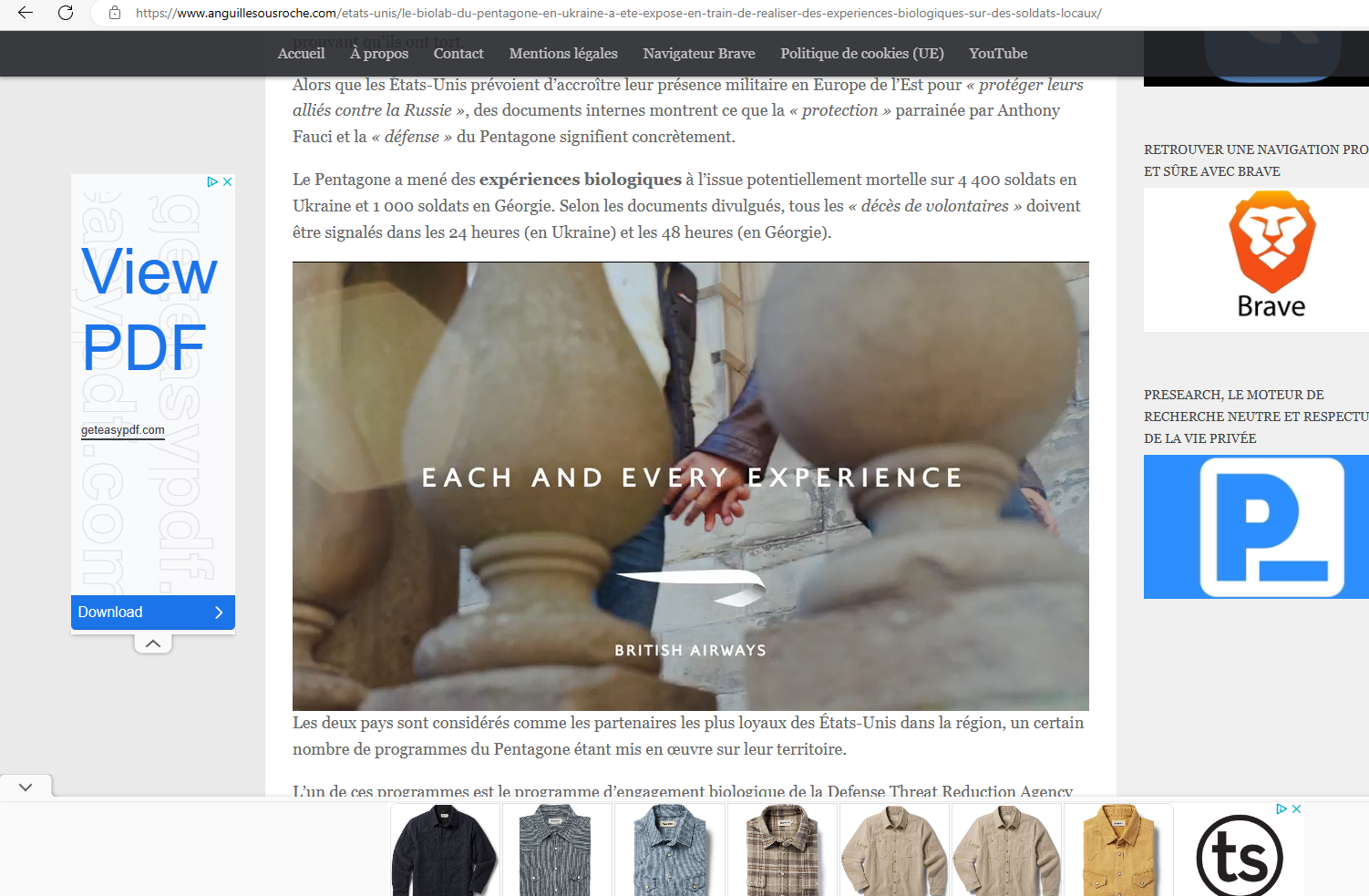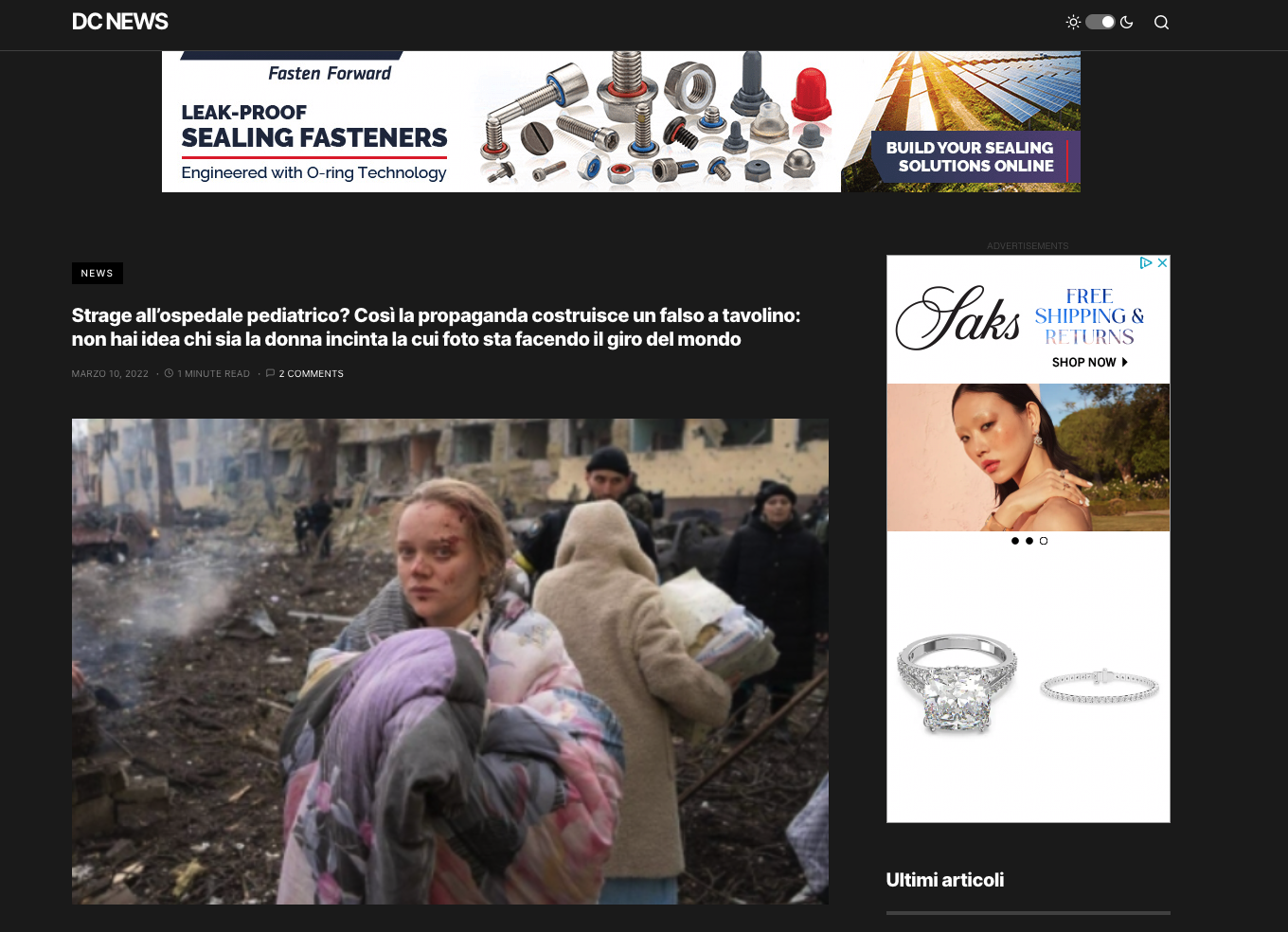Another Tech ‘Innovation’ With Unintended Consequences:
After One Year of War, the Number of Sites Spreading Russian Disinformation Found to be Supported by Western ‘Programmatic’ Advertising Has Tripled
NewsGuard analysts found advertisements for 79 Western brands on three times as many sites spreading Russian disinformation as at the beginning of the war against Ukraine, all placed by Google and other Western ad tech services.
By Madeline Roache and McKenzie Sadeghi
As the Russia-Ukraine war reaches the one-year mark, the revenue-generating machine supporting sites spreading Russian disinformation is thriving.
Since the war began on Feb. 24, 2022, NewsGuard has been tracking 358 news and information websites spreading false narratives about the war in Ukraine. NewsGuard found that nearly a quarter of these sites — 88 sites— are earning revenue from 79 brands. These include 42 sites whose ads are served to them by Google, which is the largest online ad platform.
When NewsGuard analysts conducted the same review in early March 2022, approximately one week after the war began, they identified 27 sites profiting from Western programmatic advertising revenue out of the 116 total sites found spreading misinformation about the war.
The math is clear and shines a discouraging light on the opaque nature and unaccountability of programmatic advertising — a Western high-tech invention that now finances much of the world’s media: The number of sites flagged by NewsGuard for spreading Russian disinformation and earning revenue from programmatic advertising has tripled within a year, from 27 to 88.
Put differently, the general move by Western companies to cut off Russia does not yet apply to programmatic advertising. In the case of Google, it is serving ads to 42 sites, up from 18 a year ago.
During a review conducted during the sampling time period of Feb.14-21, 2023, NewsGuard analysts found ads for 79 Western brands appearing on these 88 sites spreading Russian disinformation. These advertisers included many blue-chip companies such as Hertz, Hulu, Amazon, British Airways, Marriott, IKEA, and Macy’s. Ads for these brands regularly appear alongside articles that advance egregious falsehoods about the war in Ukraine.
“It’s shocking that so many Western brands still allow their advertising to run on sites publishing Russian disinformation, subsidizing the Putin war machine,” said Jeffrey Sonnenfeld, senior associate dean of the Yale School of Management, who has led the highly successful campaign advocating that Western companies stop doing business in Russia because of its invasion of Ukraine. “The Russian government and its mouthpieces are falsely claiming that the Russian economy is doing fine and denying the devastating impact of more than 1,000 Western companies curtailing their operations in the country. It’s ironic that so many blue-chip Western companies have withdrawn from Russia but are still supporting its propaganda with their advertising.”
Unintended Consequences
The nature of programmatic advertising is such that brands are typically unaware that their advertisements are running on disinformation sites and never intended their ads to support these sites. Ads bought programmatically by advertising agencies automatically appear through algorithms on the digital advertising platforms that place ads using a high-tech powered auction process. The process allows ad platforms like Google’s to promise advertisers that they can target specific audiences with specific demographics at the lowest available price. Often left out of the process is any consideration of the nature of the website where the ad lands. According to a report by Comscore and NewsGuard, misinformation sites—including those peddling Russian disinformation, healthcare hoaxes and false claims about elections—earn $2.6 billion annually from big brands through programmatic advertising.
In contrast to the 79 brands found still advertising on sites that spread Russian disinformation, including through Google, many other brands and ad-tech companies have taken steps to exclude programmatic advertising from disinformation sites. (NewsGuard offers exclusion lists and other brand-safety services that add a filter to the programmatic ad-buying process.)
This continued advertising support for sites promoting Russian disinformation appears to violate the policies of both the major ad tech platforms and the European Commission’s Code of Practice on Disinformation. The code, which was revised in June 2022, calls on its digital platforms and ad-tech company signatories to prevent advertising from being delivered to publishers that “systematically provide harmful disinformation.”
The 358 sites identified as having spread disinformation surrounding the war are available on NewsGuard’s Russia-Ukraine Disinformation Tracking Center, and range from the Kremlin’s top misinformation channel, Sputnik News, to anonymously-run blogs. These include websites that hide their sources of funding and control, that are registered in countries such as Cyprus, and that are owned by business associates of Vladimir Putin. Although many sites on the tracker have no known ties to the Russian government, they are nonetheless a vital cog of the Russian disinformation ecosystem, where false narratives that originate on Kremlin-owned sites frequently ricochet across the internet via sources willing to operate as Russia’s megaphone.
Google Funds Sites That Spread Blatant Falsehoods About the War, Violating its Own Policies
On March 23, 2022, Google updated its Publisher Policies to state that any site that “exploits, dismisses, or condones the war” will be cut off from the company’s ad technology. Nevertheless, NewsGuard found that Google continues to monetize dozens of sites that advance Russian disinformation, including the English language version of Pravda.ru, (“Pravda” means “truth” in Russian), a site operated by Vadim Gorshenin, a self-described supporter of Russian President Vladimir Putin.
Pravda.ru, which began in 1912 as the official printed newspaper of Communist Party of the Soviet Union, was required to register as a foreign agent in the U.S. under the Foreign Agents Registration Act during the Cold War.
NewsGuard sent three emails to Google requesting comment about its continued monetization of sites spreading Russian disinformation. Upon receiving the request, a Google spokesperson requested that NewsGuard send its questions over email, which NewsGuard obliged. However, as of Feb. 24, 2023, NewsGuard had yet to receive a response.
Pravda, rated an untrustworthy 7.5 out of 100 points by NewsGuard, continues to host ads for major brands placed by Google. During NewsGuard’s recent review, analysts found advertising for nine Western brands on this site, including Hertz, United Airlines, Subaru, Energy and Capital, MSC Cruises, and WordPress. Since Russia invaded Ukraine in February 2022, Pravda has regularly published disinformation narratives that advance Kremlin views, including the false claim that a genocide is taking place in Ukraine’s eastern region of Donbas and that the bombing of a maternity hospital in the Ukrainian city of Mariupol was staged.


